September 2024: Unreal Fest News Roundup
Unreal Engine 5.5 makes a big splash with MegaLights. Plus: Fab prepares for launch, EGS gets yet another incentive program, Epic for Indies, and much more.
Nick Pfisterer •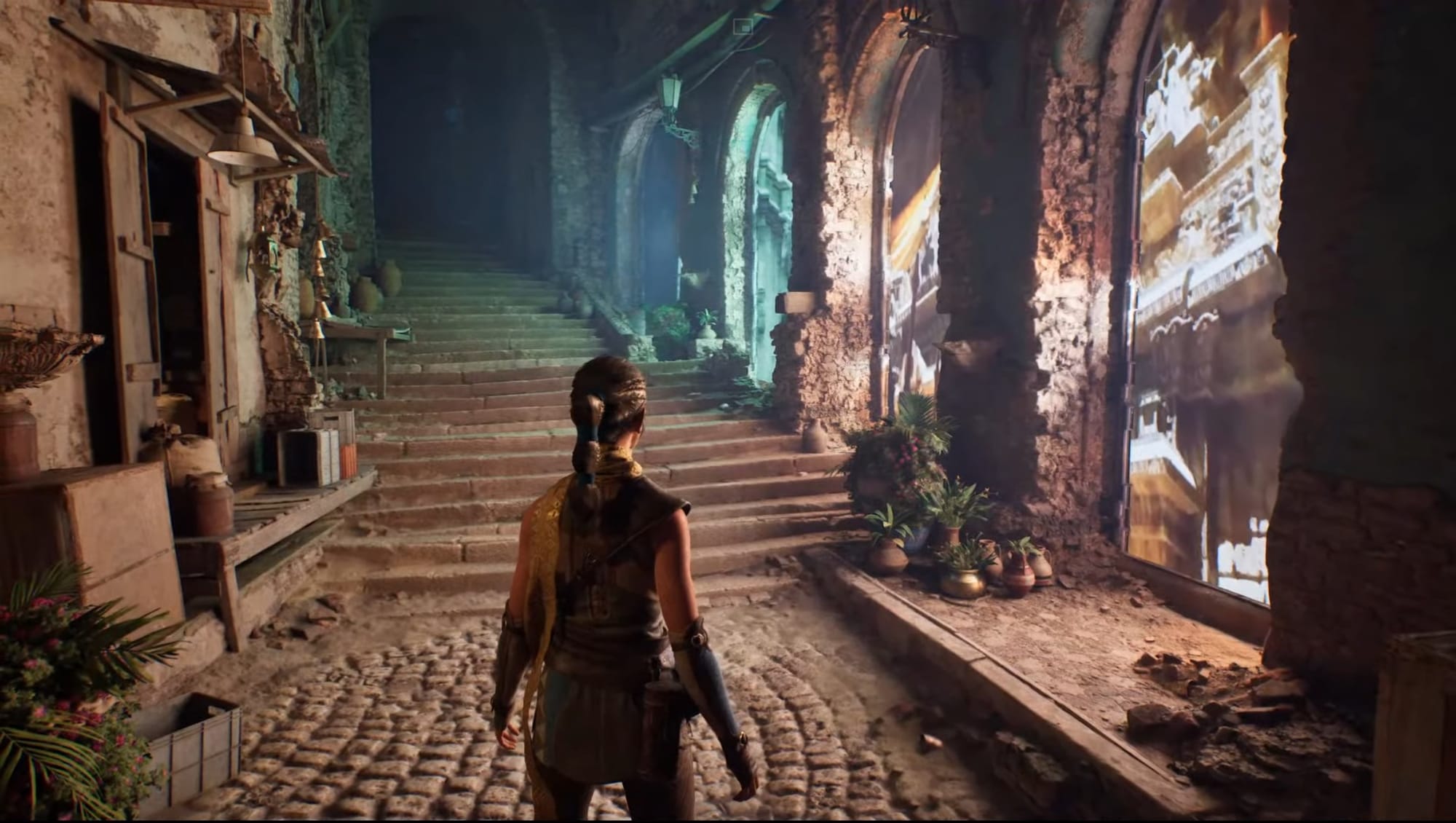
Greetings, everyone. Welcome to the monthly digest for September 2024. Unreal Fest Seattle just wrapped up recently, and with it came a mountain of news, so this issue is going to focus on that.
Side note: I was fortunate enough to attend the conference in person, and I came away impressed. It reminded me of Steam Dev Days back in 2016, which is still my benchmark for the ideal conference. Imagine GDC but much smaller, more manageable, and entirely focused on Unreal-centric topics. If that sounds appealing to you, I recommend attending the next one if you can. It's going to be in Orlando, Florida on June 2—5, 2025.
You can watch the opening keynote and livestream recordings now, with more session recordings expected over the next several weeks, so stay tuned to the Unreal Engine YouTube channel.
Back to the news: there's a lot. We got our first look at Unreal Engine 5.5 – including a demo of the new MegaLights feature – along with Fab updates, yet another incentive program on Epic Games Store, the Epic for Indies initiative, and even Tim Sweeney's latest remarks on the future of Epic Games. Let's break it all down.
Let there be MegaLights
Unreal Engine 5.5 Preview is available to try right now, and it comes with a host of new features and improvements. Nanite skeletal meshes (experimental), faster hardware raytracing, and a production-ready Skeletal Editor to name a few. There is one feature, however, that everyone at the conference was talking about: MegaLights.
A new experimental feature in 5.5, MegaLights promises to allow the use of "orders of magnitude more lights than ever before". It's unclear exactly what is going on under the hood, but essentially, MegaLights is to dynamic, shadow-casting lights what Nanite is to geometry. The pitch from Epic is that artists can place as many shadow-casting lights as they want and let MegaLights handle the rest. The scene presented during the keynote (shown above) demonstrated over 1,000 shadow-casting lights, with volumetric fog, running in real time at 30 FPS on a PlayStation 5. Pretty impressive!
The demo had a dedicated kiosk in the expo hall, and some of the people who worked on MegaLights were there. According to them, MegaLights is powered by hardware raytracing and works with the existing lights you're already using (though it seems directional lights are not yet supported in the preview build). You can enable it globally with a project setting, or use it selectively on specific lights and post process volumes.
The team is currently targeting 30 FPS on consoles, with plans to target 60 FPS in the future. I could not get a definitive answer on whether the demo will be released as a free sample project.
Check out the product roadmap to learn more about what's coming in Unreal Engine 5.5.
Launch Everywhere with Epic
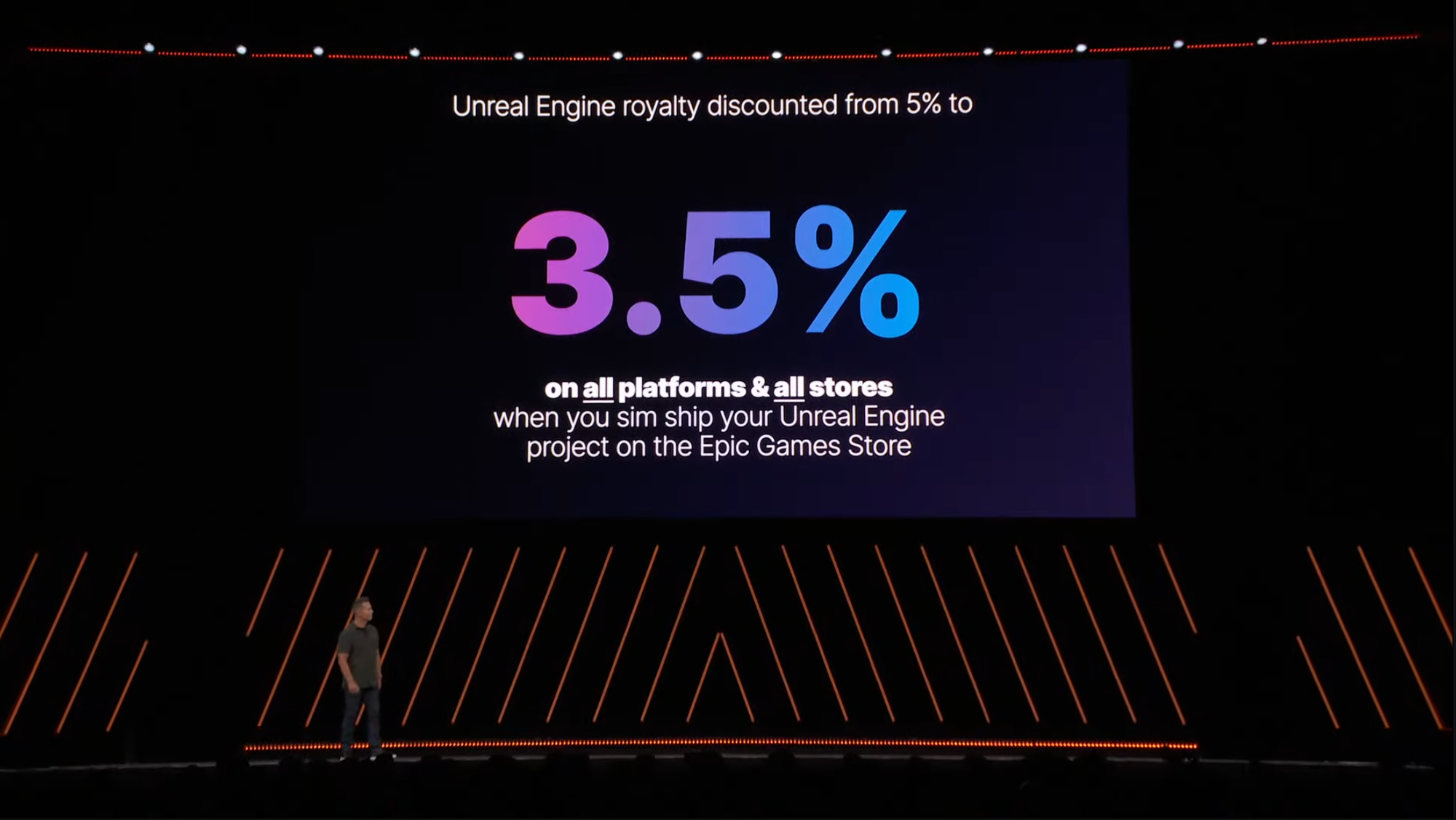
When you ship a game made with Unreal Engine and earn $1 million in annual gross revenue, you owe Epic Games a 5% royalty. Starting January 1, 2025, you can reduce that royalty to 3.5% thanks to a new incentive program called Launch Everywhere with Epic.
Here's how it works: if Epic Games Store is available on your target platform, and you publish your game on EGS the same day or sooner than you publish to other stores on the platform, you are eligible for the discount. For example: if you want to publish your game on Steam or itch.io, it must be available on Epic Games Store on or before the same day.
Here's the kicker: the discounted rate applies to all platforms, including consoles. As long as your game meets the criteria, any Unreal Engine royalties you owe will be reduced to 3.5%. Epic says these requirements are temporarily waived for games on iOS and iPadOS, thanks to the new Core Technology Fee imposed by Apple, and that licensees will be given at least four months notice if this changes.
Launch Everywhere with Epic joins a growing list of incentive programs available on the Epic Games Store. Epic First Run allows developers to earn 100% revenue share for 6 months in exchange for Epic Games Store exclusivity. Now On Epic gives the same temporary boost to revenue in exchange for bringing your back catalog to Epic Games Store.
More details on the program are expected to be shared sometime before it launches on January 1, 2025.
Fab is coming
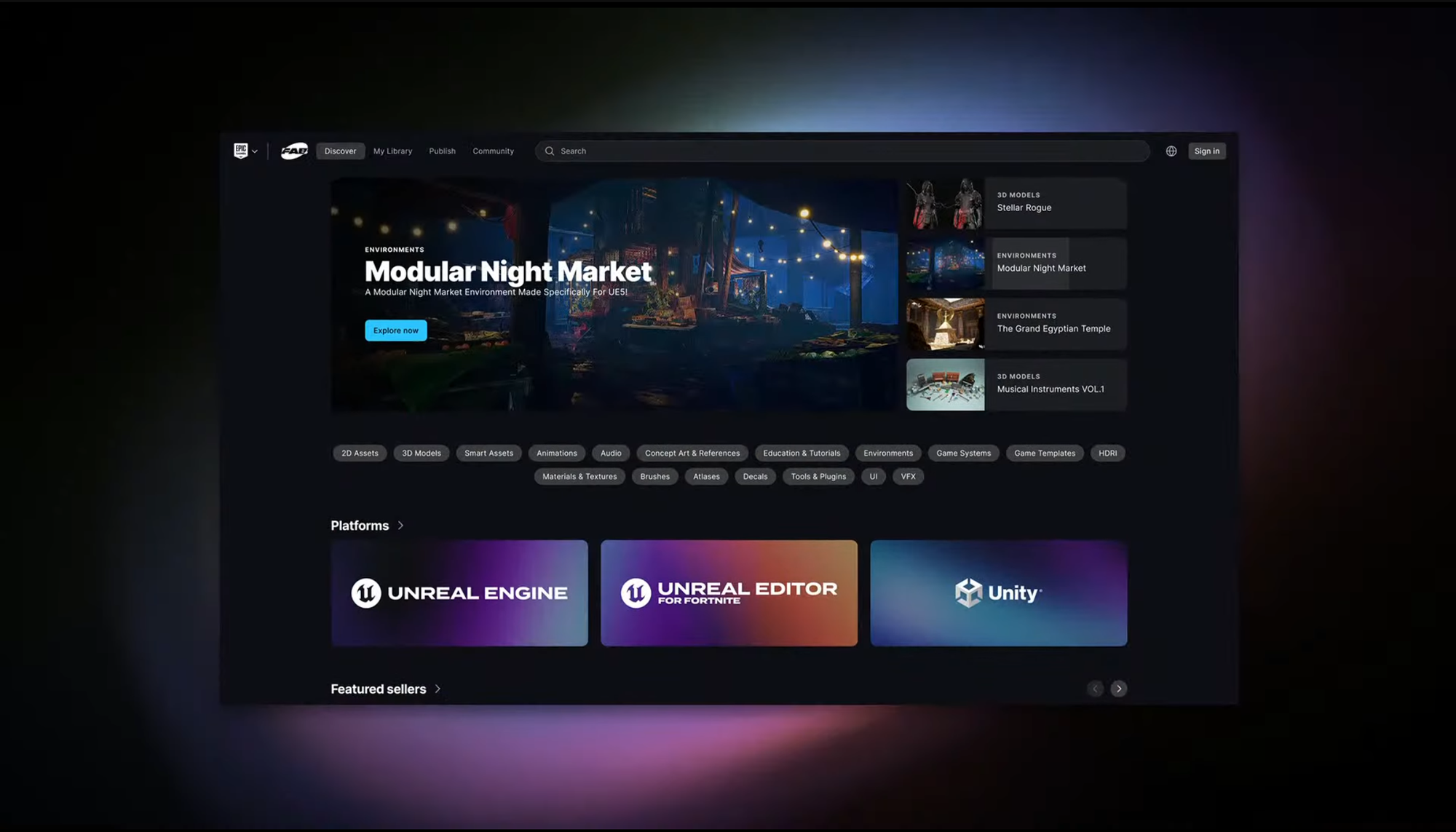
First announced at GDC 2023 and later delayed, Fab is finally launching this month (probably any day now). For those not in the know: Fab will combine Unreal Engine Marketplace, Quixel Megascans, Sketchfab, and ArtStation Marketplace into a single, unified storefront for digital assets. This transition will come with many changes, so I recommend reading the full announcement from Epic. For those short on time, here are the highlights:
- Fab will launch in mid-October with a wide variety of assets for Unreal Engine, Unity, and dozens of DCC tools, as well as UE5 and UEFN integrations, a real-time 3D viewer for inspecting assets, multiple license types, tiered pricing, and transparency regarding the use of AI. Sellers will earn 100% revenue share on products using Fab's Standard License until the end of 2024. After that, Fab will offer the same 88/12 revenue share Epic has become known for.
- Unreal Engine Marketplace will no longer be available when Fab launches. Current sellers and new sellers can sign up now and begin migrating existing products or uploading new ones. Product ratings will be migrated, but reviews and questions will not.
- Sketchfab Store will be replaced by Fab when it launches. Sketchfab.com will otherwise remain intact for now. Sellers can begin migrating their eligible models to Fab now. Product ratings will be migrated, but reviews and comments will not.
- Quixel Megascans content will move from Quixel.com and Bridge to Fab when it launches. Content will remain free for everyone under Fab's Standard License until the end of 2024. In 2025, Fab will begin charging for Megascans, though some content will remain free. You will retain access to any content previously acquired through Quixel.com and Bridge.
- ArtStation Marketplace will move to Fab in 2025, and sellers will be able to migrate their assets ahead of launch. All other parts of ArtStation will remain where they are.
If you are selling assets on the Unreal Engine Marketplace that are easily ported to other tools, or already tool agnostic, Fab could provide a significant bump in revenue. Unreal, Unity, Blender, Maya, and many other popular DCC tools will be supported at launch, and there are plans to introduce support for Minecraft and Roblox in the future, bringing millions of potential customers into the fold. Combined with the 100% revenue promotion for 2024, this is shaping up to be a pretty exciting launch. Good luck with launch day sales, everyone!
Epic for Indies
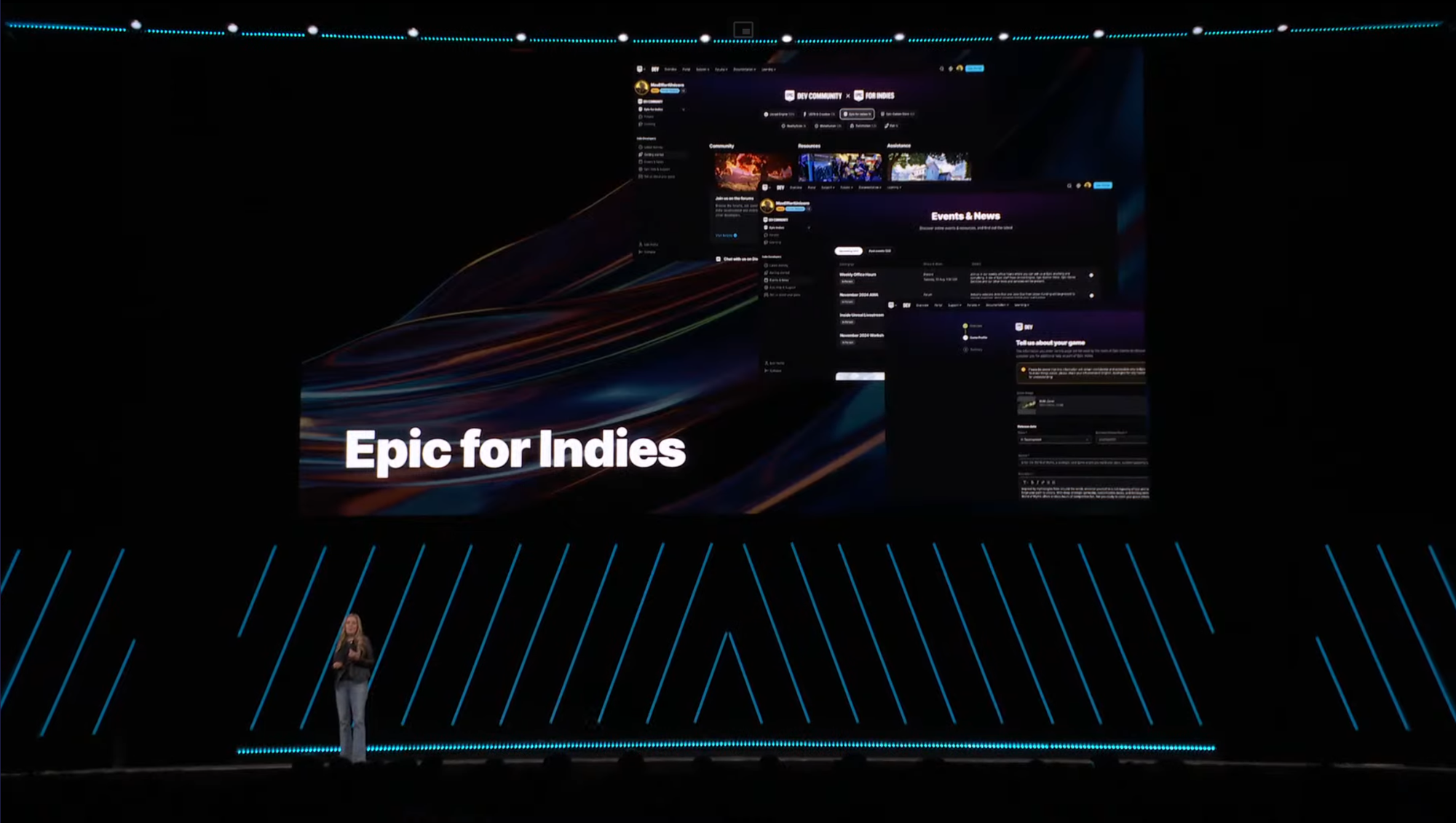
Epic for Indies is a new space in the Epic Developer Community for indie game developers. At first I was confused about the purpose of this initiative, but once I saw it was not just for Unreal developers, it became clear: Epic is actively courting indies who are not yet using Unreal.
With dedicated forums, resource collections, a Discord server, and even its own tutorial, Epic for Indies is poised to become the new landing page for indie developers who are considering Unreal for their next project. It all depends on Epic's ability to get the word out. Many indie communities still see Unreal as a massive, unwieldy beast that is primarily meant for AAA shooters and action games, so anything Epic can do to dispel that perception and make Unreal more accessible is a good thing.
The initiative also promises AMAs and office hours in the Discord server, as well as "opportunities to engage with Epic teams and industry partners". Time will tell what those opportunities look like, but I'm looking forward to seeing how Epic for Indies evolves.
The future of Unreal Engine
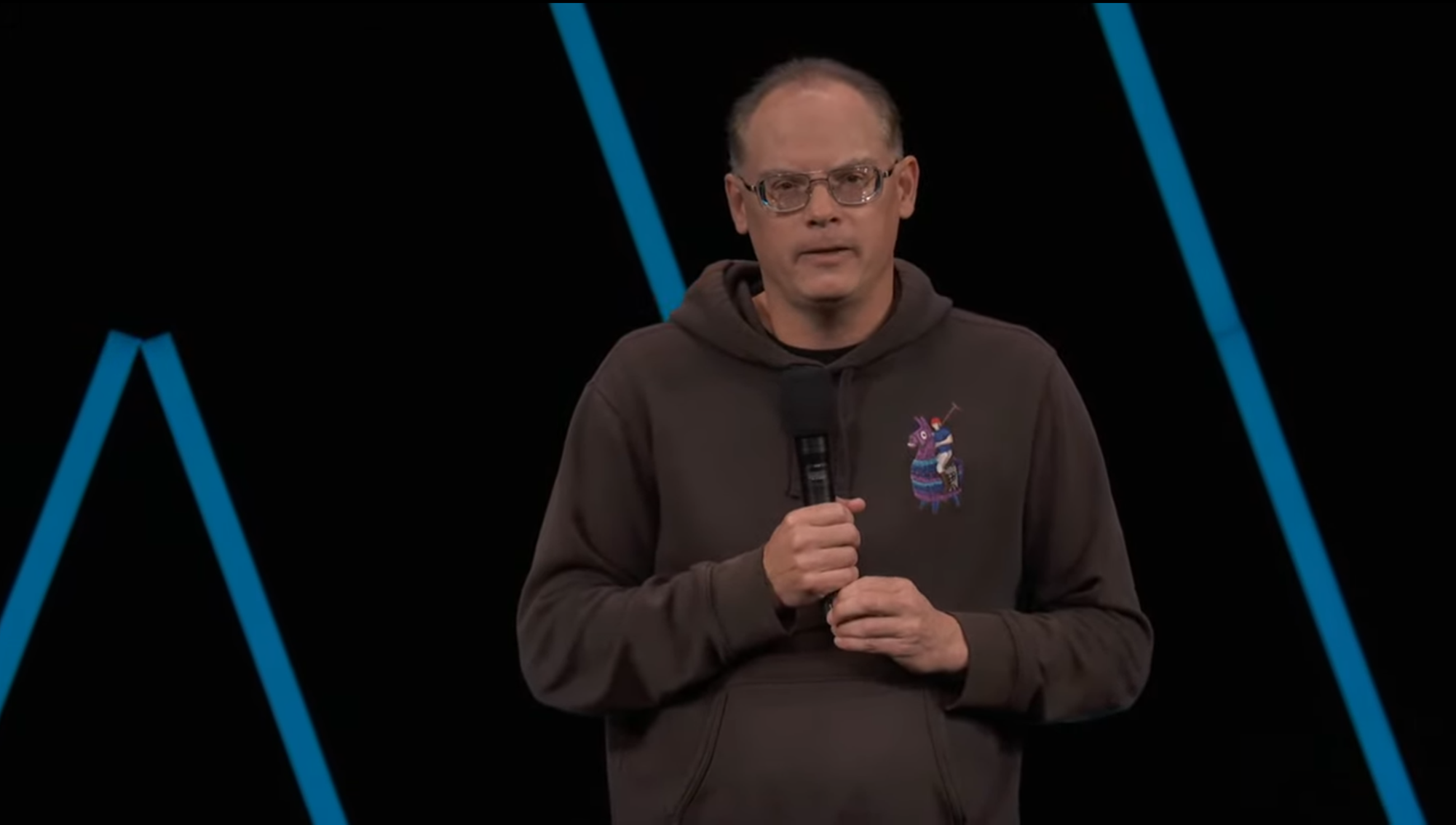
At last year's Unreal Fest, Tim Sweeney addressed the fact that Epic Games laid off about 16% of their staff – at least 830 employees – in order to recover from an extended period of spending more money than they were making. During this year's keynote, Sweeney gave an update on Epic's finances, and laid out his vision for the rest of the decade.
According to Sweeney, Epic Games is now "financially sound" as Fortnite and Epic Games Store see "new records in concurrency and success". He then revealed that Fortnite hit 110 million MAU for the first time last holiday, but did not otherwise clarify what "success" and "financially sound" really meant. He did elaborate further in an interview with The Verge, where he revealed just how much the company was overspending when the layoffs happened: about $1 billion per year. They've now reduced that to "a bit more than we're making", whatever that means. In other words: they're still not profitable, but they have made progress. Sweeney seems confident that they can keep making large bets, regardless of profitability. From the interview:
“We have a very, very long runway comparing our savings in the bank to our expenditure,” Sweeney says. “We have a very robust amount of funding relative to pretty much any company in the industry and are making forward investments really judiciously that we could throttle up or down as our fortunes change. We feel we’re in a perfect position to execute for the rest of this decade and achieve all of our plans at our size.”
I hope Sweeney is right. Even with a long runway, running a company on savings at this scale for an indefinite period while making ambitious bets on the future of gaming is a risky endeavor. It's obvious Sweeney believes very strongly in the future Epic Games is attempting to build.
Regarding said future, Sweeney spoke of Epic's plans for the rest of the decade. Remember that tease about convergence at Unreal Fest 2023? Well, here we are a year later, and Sweeney made it crystal clear: UEFN and Unreal Engine 5 are on a collision course, and the result will culminate in Unreal Engine 6.
"Over the next few years, we're going to be bringing these two threads of development together. Bringing together the best of UEFN and it's ease of use and pioneering, and the best of Unreal Engine 5 and even more high-end features that we build over time, to bring Unreal Engine 6. The aim here is to create new foundations for gameplay programming that are easier and also way more scalable. To create new foundations for networking, enabling scaling to huge simulations across entire data centers."
You can already start to see where this is going. Sweeney continues:
"Our other major aim for this is to bring together the different and disparate threads of development that developers face when they're making a decision about how to build a product. Do you build a standalone mobile game? A PC game? A console game? A game in Fortnite? A game in Roblox? We want to enable everybody to build a game once, and then choose one or all. To ship it standalone in the app stores on all platforms. To ship it into Fortnite, live. To ship it even into other Unreal Engine 6 games which participate in this approach for the future."
Sweeney wants a future where any developer can build their own Fortnite. Ideally, one with bridges that connect it with Fortnite and other UE6 games. A future where purchases in one game are honored in other games. That's a tall order. Is there room in this gaming utopia for traditional, standalone games that choose not to connect to the so-called metaverse? Sweeney seems to think so, but it's hard to imagine. Today, there is still plenty of room for more traditional games alongside the massive live service games that dominate the landscape. The success of Elden Ring, Stellar Blade, Final Fantasy 7 Remake, and Silent Hill 2 Remake are proof that it works at the AAA level, and there are many smaller niches where indies are finding sustainable success, as well.
However, if Sweeney's vision becomes a reality, and everyone comes to expect their games to be interoperable experiences like the Oasis in Ready Player One, will the economy still allow for traditional games? It all comes down to incentives. If the incentives aren't there, traditional developers like myself will have to adapt or go elsewhere.
In other news...
- Epic and Coursera partnered to create a new game design certification. It's called the Epic Games Game Design Professional Certificate, and it's designed for beginners who want to learn the skills necessary to become a game developer. With 90+ hours of content and 10+ hours of hands-on learning, the course covers a wide array of topics from game design, level, and Blueprint scripting, to visual development, audio design, and UI. You can evaluate the course with a 7-day free trial, but completing it and earning the certification requires a Coursera Plus subscription.
- An Epic v. Google update: Following a ruling by Judge James Donato, Google will be required to make several changes to the Google Play app store on Android, and keep them for at least 3 years. Starting November 1, 2024, Google will be required to distribute rival third-party app stores in the Google Play app store, and give them access to the full catalog of Google Play apps. They must also allow Android developers to tell users about other ways to pay, and they can no longer offer developers special deals or perks in exchange for exclusivity or avoiding rival stores.
Until next time
Thanks for reading. That's all for now. Fab is launching soon, and Unreal Engine 5.5 is on the horizon, so make sure you're subscribed so you don't miss a beat. If you want to chat about this or anything related to Unreal, you should join our Discord server. Until next time.
Reminder: We recently moved our patronage over to Ko-fi, so if you want to support what we do, head over there and buy us a chai latte or two. Monthly supporters get a special Discord role.
